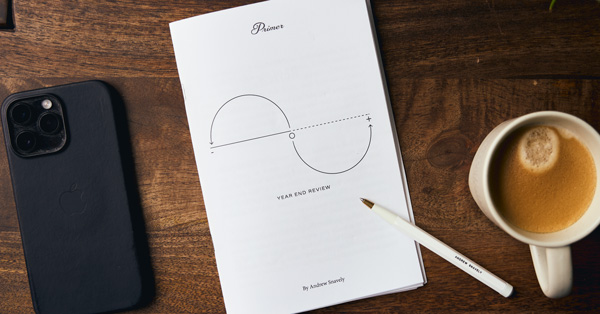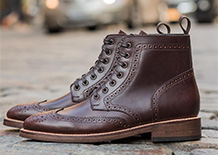 |
Special thanks to Thursday Boot Company co-founders Nolan and Connor for teaming up with us to get the inside scoop on starting and building a company from scratch in the modern Internet Age. Be sure to check out their full line of affordable handmade boots.
What is this? |
You may have heard of the Thursday Boot Company, via our Definitive 10 Best Boots roundup or Chukka review, or from a friend or perhaps an ad for Thursday has popped up in your Facebook feed. They seem to be everywhere these days. But three years ago Thursday Boot Company didn’t exist beyond an idea in its founders’ heads.
The Thursday Boot Company is one of our favorite brands because they’re focused on quality, style, and smarts – three values we esteem. Thursday offers a premium, handmade, fully-featured boot for half the cost of more established brands. We wanted to know a bit more about how they do it and why, so Primer sat down with Thursday co-founder Nolan Walsh to hear the story of the company and ask him a few questions:
- How did this still-tiny startup go from twinkle-in-the-eye to moving thousands of pairs of boots a month?
- Even more unlikely, how did they do it in the already crowded market of men’s boots?
- And what can their story reveal about being an entrepreneur in an age when more and more all-digital storefronts are selling handmade goods?
A Chance Encounter in Nicaragua
Nolan and co-founder Connor Wilson – who met their first year at Columbia Business School – had spent the winter of 2013 looking unsuccessfully for an affordable men’s boot. “It was a classic Goldilocks problem,” says Nolan. “It seemed like everything was either too bulky or too trendy and delicate, and everything in my price range was liable to start falling apart after a couple of wears. Connor had the exact same experience. We knew there was a gap in the market, but we didn't know what to do about it.”
Spring break found them on a budget surf trip in Nicaragua when they met a fellow traveler wearing a men’s boot that caught their eye. Nolan remembers, “I was compelled to ask the guy wearing them about it because they were close to the style I was looking for and couldn't find.” It turned out the boots were made by local Guatemalan craftsmen in a small town called Pastores, full of small custom boot shops. Intrigued by the idea of making their own boots, Connor and Nolan decided to take a short side trip to meet the Guatemalan bootmakers and ended up spending two weeks learning everything they could about hand making a boot and absorbing wisdom about materials, design, and production. At the end of the two weeks they had made nearly 15 samples. While Nolan laughingly said those first samples were far from perfect, the very first R&D for Thursday Boot Co. had begun.
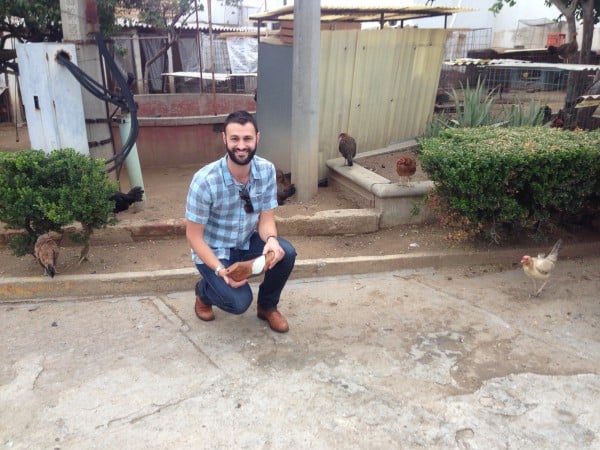
Making the first Thursday Boot Co. last in Guatemala
“Thursday came about as a passion product,” says Nolan. “We weren’t sure it was a business venture at first, just something we wanted to do for ourselves.” As students they couldn’t afford $350-500 for a pair of premium handmade boots, and boots in their price range fell apart quickly. “We really just wanted to make boots for ourselves and see if anything would come from it.”
After Guatemala, they threw themselves into bootmaking full time. Nolan says, “Our friends thought we were crazy. While everyone was getting these prestigious jobs in banking and consulting, we were emptying our savings to make samples and working 7 days a week on things like cork quality and leather grading.” Even though Nolan and Connor hadn’t set out to become bootmakers, each new prototype brought them closer to becoming bootmakers. “We leveraged those first samples to make more samples at a good factory, then leveraged those to make progressively better samples,” he remembers.
The early versions were far from perfect, which is a key takeaway from Thursday’s early stage before they were even a company: Don't stress about needing your product or service to be perfect from the get-to. As Nolan told me, his advice to fellow entrepreneurs, “Take the first step, then break everything else into smaller steps and focus on what’s in front of you. That’s still basically how we do things today.”
An idea began to take hold: could they create a durable, stylish boot at a reasonable price? Could they turn their concept into a full-fledge company? And more immediately: how do you take a design sample into production?
Cold-Calling Their Way to a New Family
Connor and Nolan drew up a list of features they wanted in their ideal boot. First, they identified Goodyear Welt Construction as a must. Goodyear welting is the top standard for boot construction, used in only the top 1% of men’s footwear. It creates a near-waterproof seal at the insole and it makes a boot resoleable. Then followed a series of top-of-the-line features: Tier 1 Grade A leather from US cattle, glove leather lining, a cork bed midsole, and low profile studded rubber outsoles good for handling difficult terrain and slippery bar rooms.
As they were perfecting their designs, they took another critical step towards becoming a real company: building a network by picking up the phone.
Entrepreneurs will tell you: Mentors are crucial to the success of a startup. In the early days of Thursday Boot Co. that mentorship didn’t come from the usual sources. “We went in with zero connections,” explains Nolan, “And we were really lucky that a lot of people we reached out to with cold calls and emails took time to invest in us.”
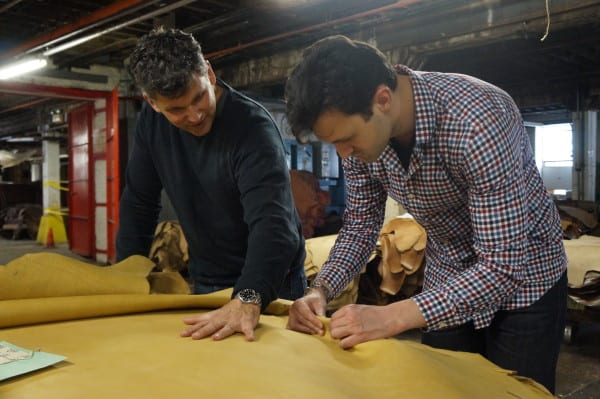
Connor at Horween Leather Co.
Industry-leading brands including Horween (leather), JC Edwards (packaging) and Vibram (soles) provided essential, open-handed counsel to Thursday, helping them arrive at exactly the right materials for their application. “Even the box manufacturers have taken a lot of time to go through everything with us,” says Nolan. “We came into the shoe business with no industry connections and we’ve made a family with the people we’re working with.”
Supplier relationships in place, Thursday was tantalizingly close to having a real product to roll out to friends and family. Now they just needed a factory to put it all together using skilled craftsman working by hand to perfectly implement their many design features everytime, without fail. Simple, right?
Nolan says their status as newcomers in a traditional industry – and their lack of awareness of protocol for how things should be done – actually helped them out. “We needed a factory,” says Nolan, “and we were nobodies.” In the process of contacting factories all over the world, they learned of a town in Mexico with a deep history in making western-style leather boots: Leon. So they went.
“Leon has a tradition of making excellent leather boots, so we went and spoke to every factory there and honed in on our current facility,” says Nolan. Although Thursday doesn’t shy away from the fact that the majority of their production is based abroad – Nolan stresses that transparency is a core value for Thursday. “People can be skeptical of buying products online from startups. The best way to ease that skepticism is to be as straightforward and genuine as possible.”
Thanks to the transparency of the internet, anyone can find out that many brands claiming domestic production only make a fraction of their product here in the states.
“Our boots are made using the same suppliers and the exact same craftsman that make the top tier brands charging twice the price,” says Nolan. To ensure the quality was up to snuff, Nolan or Connor spend one week of every six at their Leon facility and hired a local full-time production manager.
Dream Becomes Reality
Now that they had someone to make their boots, the fledgling Thursday Boot Company needed the lifeblood of any startup: capital. All the months spent learning, prototyping, and meeting suppliers had been on their own dime. “We raised $0 of external capital before launching,” said Nolan. “I literally emptied my savings account and 401k for the down payment on production, which Connor and I personally split. Our full marketing budget when we launched was only $1,500.”
The first financial break came when Connor and Nolan convinced their factory in Leon to build several thousand pairs on spec for their Kickstarter campaign, a feat virtually unheard of in the industry. “We convinced our factory to essentially gamble on our product and vision,” says Nolan, and they were willing to accept only a partial down payment for production. The gamble paid off when the Thursday Boot Co. Kickstarter was funded more than $100,000 in the first 30 hours.
After a successful kickstarter raising over $275,000 and selling out their next two batches of production, Team Thursday was ready to raise some external capital. Thankfully, they had a secret weapon. “Most of the investors had already purchased a pair of boots, so they were familiar with the product and brand concept,” says Nolan. The pitch came down to convincing them Thursday was a good bet, even though they were charging well below the industry standard markup. Nolan says that in the pitches, “We focused almost exclusively on the brand and the long-term vision to provide a better product at a better price for customers.” It worked. Eight months after launch, Thursday had secured a first round of capital, which impressively included 4 of their professors at Columbia Business School.
And then the real work began.
It turns out, having a company is a bit like having a kid: It takes over your life. “When it’s your company, you really kind of always want to be working,” says Nolan, laughing. “The biggest sacrifice comes with your relationships and your family.” Thursday Boot Co. is nearly three years old now. “We’ve been working up to 7 days a week for the past three years,” he said. “Including weekends, I think I’ve missed a total of three days in the office in the last five months.”
The Power of Outsiders
Thursday Boot Company reveals a key lesson: you don’t have to be born with a silver spoon to succeed in an entrenched industry. Like this great New York Times profile on shipping innovator Malcom McLean, outsiders have an enormous competitive advantage in a long standing industry: they can see an opportunity others don’t and set about doing things differently.
If you’re going to open your storefront on the internet, however, what you do need is a dedicated fan base and the humbleness to listen to them. “Since we do most of our business direct to consumer we’re able to track customer feedback much more precisely than other brands,” says Nolan. “And we have made serious improvements because of that feedback.” One example is their rubber outsoles. After receiving feedback they reworked the outsole compound, testing it for nine months to get it right.
Being small and nimble also helps. Thursday uses a lean manufacturing model with continuous production. Translated, that means they produce in small batches with breaks in between, which allows them to make small adjustments – as they hear what their customers have to say.
In essence, Thursday is an example of the kind of company that couldn’t exist before the internet: a small team of friends engaged in a collaborative process with their consumer.
And Thursday continues to grow. They just launched their first women’s line and are on track to sell out of their initial run by the end of January. Coming in February is a new men’s boot using Horween NFL football leather. Soon after that, they drop a limited edition Shell Cordovan boot.
The final question for Nolan was, of course, about the name. Why Thursday? “Thursday perfectly describes the product – you work hard on Thursday but it’s also the unofficial start of the weekend.” Connor and Nolan wanted to make a product with that versatility, and so far have brought it to customers in all 50 states and 48 countries. Not bad for what started as a surfing trip and side-project
Check out Thursday Boots at www.thursdayboots.com



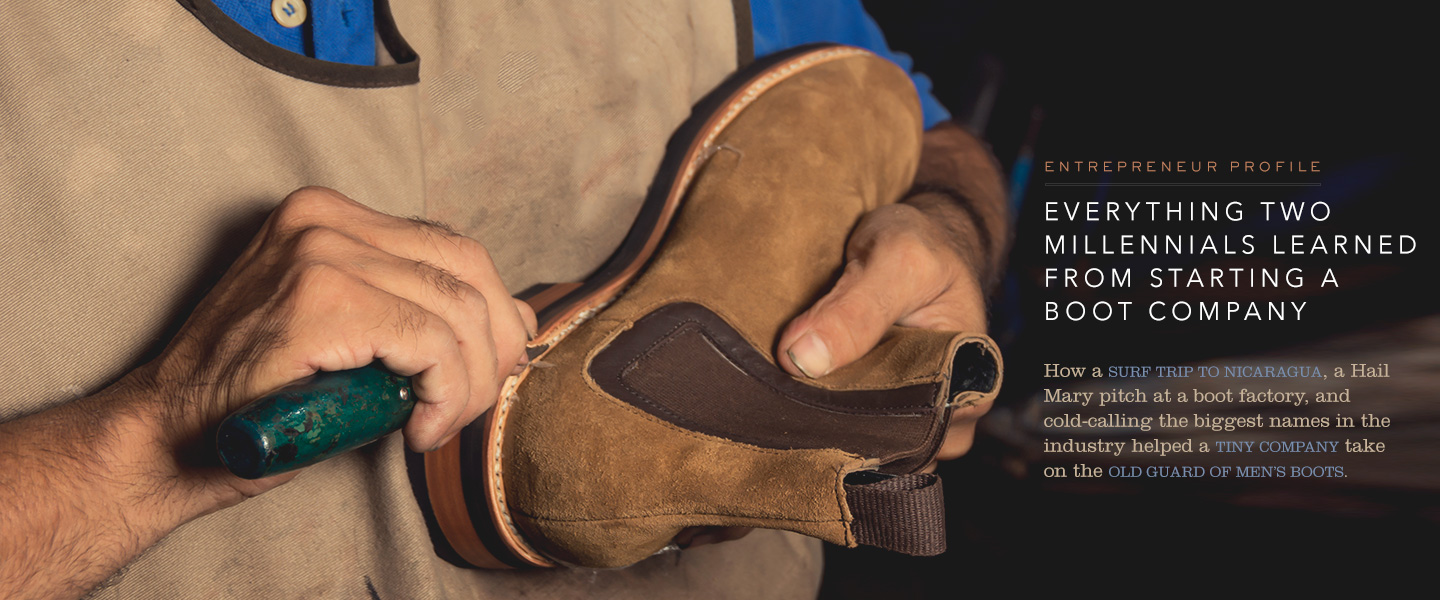
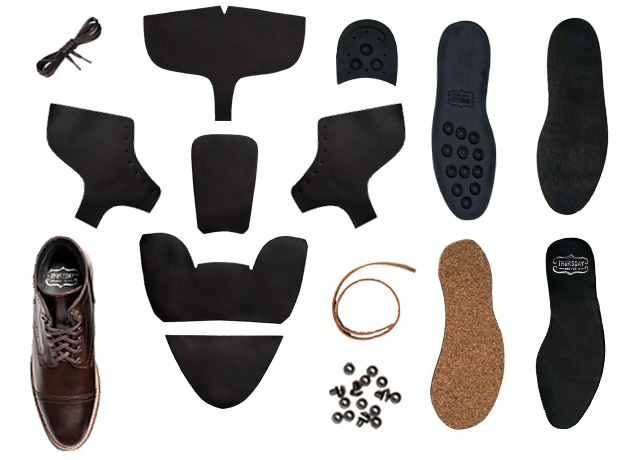
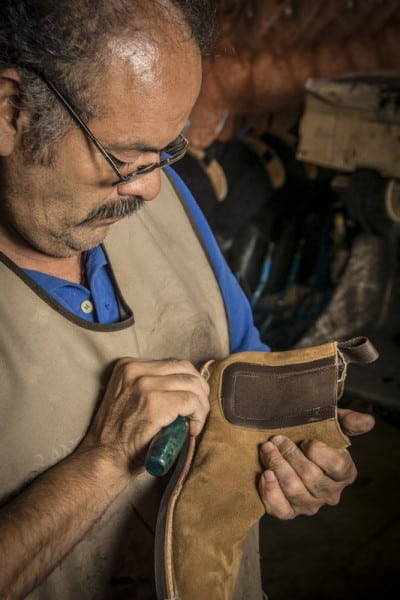

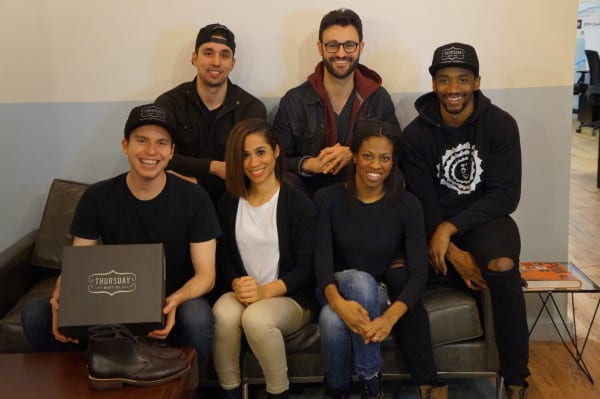
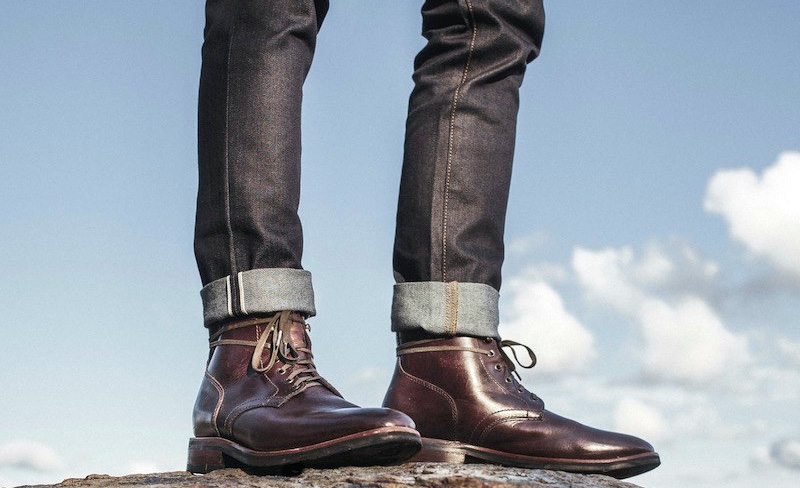


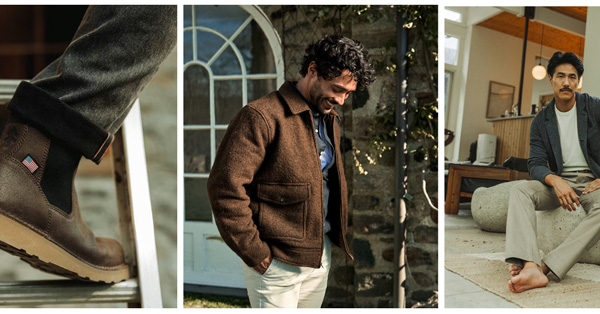

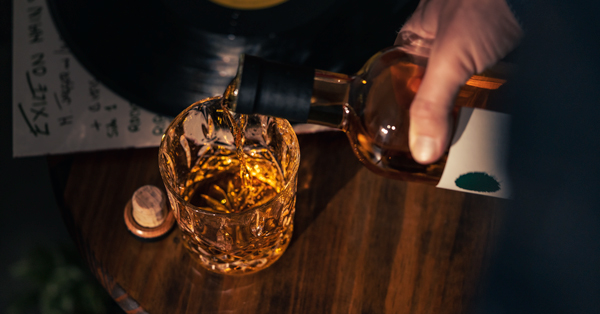

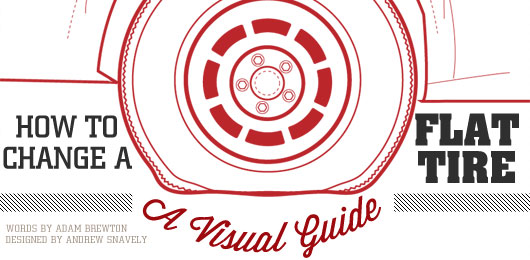



![It’s Time to Begin Again: 3 Uncomfortable Frameworks That Will Make Your New Year More Meaningful [Audio Essay + Article]](https://www.primermagazine.com/wp-content/uploads/2025/01/begin_again_feature.jpg)

